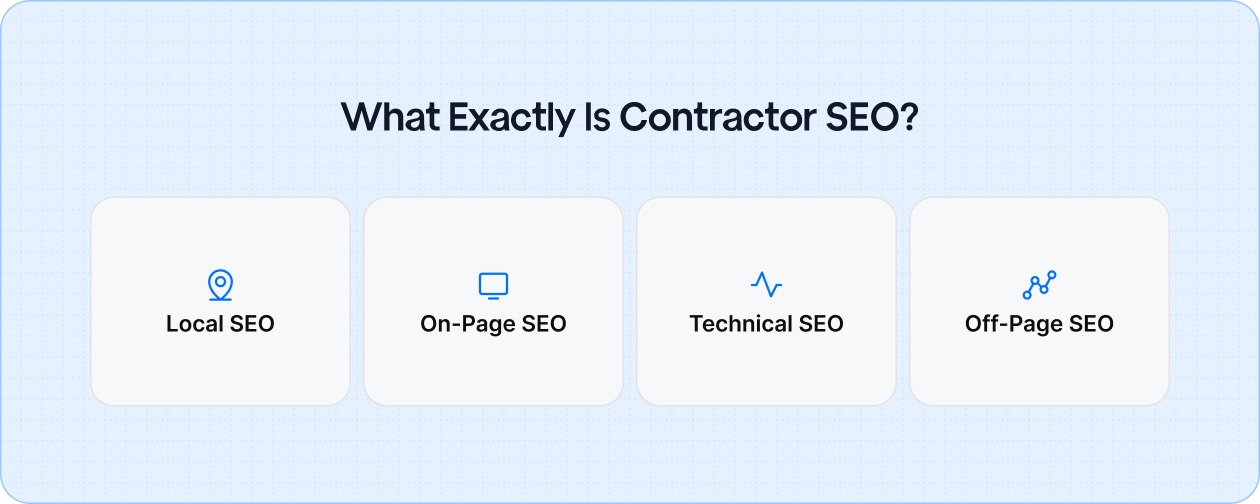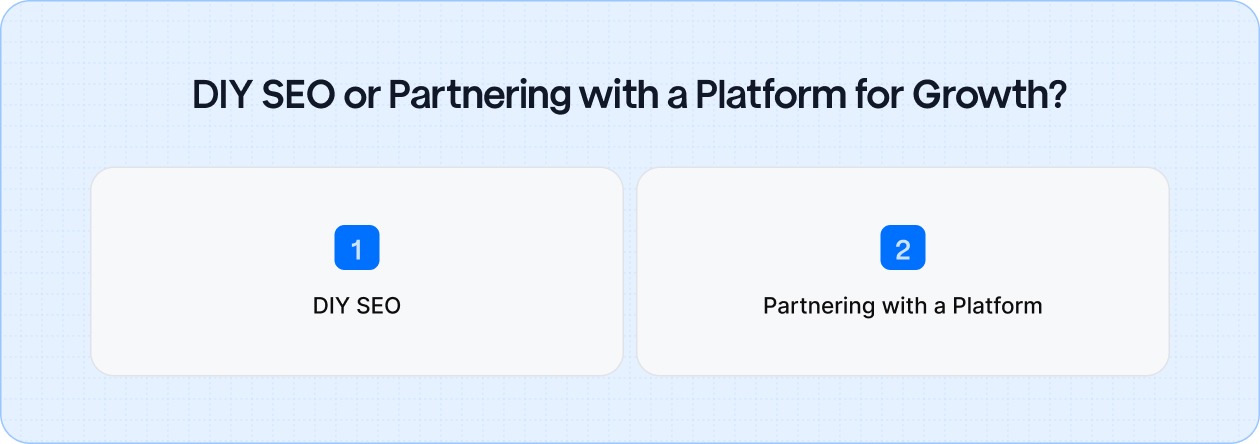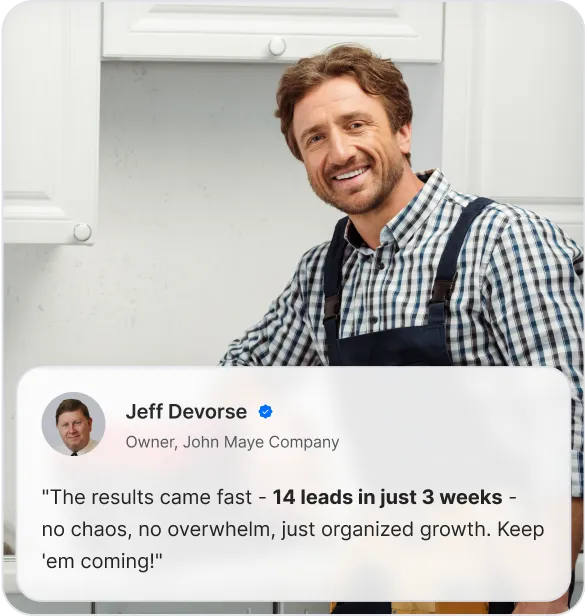When you're focused on delivering quality work and running your business, getting noticed online can often take a backseat. But with so many people searching for services like yours, your business must show up when it matters most.
Contractor SEO helps solve this problem. It’s the practice of optimizing your website to rank higher on search engines, making it easier for local clients to find you. By improving your online visibility, SEO ensures you connect with the people who need your services.
This guide will take you through the essential steps of contractor SEO, helping you reach more clients and grow your business effectively.
What Exactly Is Contractor SEO?
Getting noticed online is crucial for growing your business, and that’s where contractor SEO plays a big role. Contractor SEO is a strategy that helps your website appear when people search for services like yours. Make sure your business is visible and easy to find.

Here’s a breakdown of how it works:
- Local SEO: This helps your business show up in search results when people nearby are looking for services. It’s like putting a sign outside your store, but online, so people in your area can easily find you.
- On-Page SEO: Optimize your website's content, making sure it matches what people are searching for. If someone is looking for "plumbing services in Boston," having those exact words on your site increases the chances of them finding you.
- Technical SEO: This is the behind-the-scenes work to ensure your website is fast, secure, and easy to navigate. Search engines prioritize sites that are user-friendly, so a smooth experience is crucial.
- Off-Page SEO: This helps build your business's reputation and trust. It’s about getting other websites to link to yours, which shows search engines that your business is credible and worth showing up in results.
How Can SEO Help Your Contractor Business Stand Out
When it comes to growing your contractor business, getting noticed online is as important as delivering excellent service.
But how can you ensure potential clients find you when they search for services like yours? Here’s how SEO can make a real difference for your business:
- Brand Visibility: SEO helps put your business in front of the people who need it most. When potential clients search for services in your area, SEO ensures that you show up in the search results, giving you the visibility you deserve.
- Competitive Advantage: With a strong SEO strategy, you stand out at the top of search results, where potential clients are most likely to click first.
- Lead Generation: SEO helps turn visitors into leads by making sure your website is optimized to meet their needs. When your site is easy to find and offers helpful information, clients are more likely to reach out.
Must Read: 15 Contractor Marketing Strategies That Actually Bring You More Clients
1. Increase Your Visibility with Local Contractor SEO
Local SEO is one of the most powerful ways to ensure your business is visible when potential clients near you are searching for services.
Make sure your business appears at the top of search results for local queries, such as “contractor near me” or “plumber in Chicago.”
Here's how to master local SEO:
- Claim and Optimize Google Business Profile: A strong Google Business Profile is essential for local SEO. It improves your local visibility, making it easier for clients in your area to find and contact you.
Ensure all details are accurate and up-to-date, and encourage clients to leave reviews.
- Optimize Apple Business Connect: When optimizing for local searches, don’t forget Apple Business Connect, particularly in areas where Apple Maps is frequently used.
Ensure your Apple listing is just as complete and optimized as your Google Business Profile. Together, these two platforms will significantly improve your local search visibility.
- Local Listings and Directories: Get listed on local directories like Yelp, Angi, and others. These platforms increase your credibility and help you reach more potential customers in your area.
- Local Link Building: One of the best ways to improve your local SEO is through local link building. By gaining backlinks from respected local sources like local business directories, industry organizations, or local news outlets, you increase your authority in the area.
This tells search engines that your business is credible and relevant, improving your local rankings.

2. Optimize Your Contractor Website with SEO Best Practices
When potential clients visit your website, do they find what they’re looking for easily? Or do they leave frustrated, unable to navigate or find relevant information? To turn visitors into clients, your website needs to be optimized for both search engines and users.
Here’s how to ensure your site is ready to convert:
- Keyword Research: Find the right keywords for your services and location. These keywords help search engines understand what you offer and connect you with potential clients.
- Service and Location Pages: Create dedicated pages for each service and location you serve. This makes it easier for clients to find exactly what they need, “roofing service in New York” or “bathroom remodeling.”
Meta Tags, Headers, and Titles: Optimize your meta tags, headers, and titles with targeted keywords to help search engines rank your pages higher and make it clear what each page is about.

3. Improve Website Speed, Security, and Mobile Optimization for SEO
Website performance is a crucial aspect of technical SEO. A slow, insecure, or difficult-to-use website can drive potential clients away, even if you have the right keywords. Here’s how to make sure your website is ready to impress:
- Website Speed: Fast websites improve SEO and provide a better user experience. Slow-loading sites can cause visitors to leave before they even see your services.
- Mobile Optimization: More people are searching on mobile devices than ever before. Ensure your website is mobile-friendly so it’s easy to navigate on any device.
- Secure Website (HTTPS): Having an SSL certificate (making your website “HTTPS”) builds trust with users and search engines. It’s essential for security and SEO.
- Voice Search: With the rise of voice search, especially on mobile devices, make sure your website’s content is conversational and answers questions directly. Optimizing for voice search is an important step in improving your overall SEO for contractors.
- Schema Markup for Contractors: Another key technical aspect is adding schema markup to your website. This special code helps search engines understand your business better and display more information in search results, like reviews, business hours, and service areas. This is especially important for contractors because it:
- Clarifies services: It helps search engines understand the services you offer, such as "roof repair" or "bathroom remodeling."
- Improves visibility: Adds extra details like customer reviews, which can make your business stand out in search results.
- Enhances local SEO: Schema also helps define your service area, increasing your visibility to nearby clients who are actively searching for contractors.
4. Build Authority with Backlinks and Reviews for SEO
As a contractor, your reputation is everything. How do you show potential clients that you're reliable, experienced, and the best choice for the job? Building trust and authority online is a key part of this process. Here's how to make it happen:
- Backlink Strategy: Backlinks are recommendations from other reputable websites. When other trusted sites link to yours, it signals to search engines that your business is credible and valuable.
This improves your rankings and enhances your authority in your field. The more quality backlinks you have, the stronger your site’s authority becomes.

- Social Proof and Reviews: Customer reviews are one of the most powerful ways to build trust online. Positive feedback from happy clients shows potential customers that you deliver on your promises.
These reviews improve your reputation and help you rank higher in search results, making it easier for new clients to find you.
- User-Generated Content (UGC): Incorporating user-generated content, such as authentic client testimonials and project photos, helps build trust with potential clients and improves your SEO.
Reviews on your Google Business Profile and other local platforms show that real clients trust you and your work.
5. Engage and Educate Clients with SEO-Driven Content Marketing
One of the best ways to attract new clients and build trust is by showcasing your expertise through content. Add value by answering the questions potential clients are searching for. Here’s how content marketing can help you stand out:
- Blogging and FAQs: Regularly publishing helpful blog posts or answering frequently asked questions allows you to address your clients' concerns.
By offering valuable insights, you establish yourself as an authority in your field, making it easier for clients to trust you with their projects.
Video Content: Videos are a powerful way to connect with clients. Showcasing your work on a project, sharing client testimonials, and explaining your process through video helps potential customers see your expertise in action.

6. Track and Analyze Your Contractor SEO Success
Once you've implemented your SEO strategy, it's important to track how well it's working. You can't improve what you can't measure, so here’s how to monitor your progress and adjust your approach:
- Google Analytics: Google Analytics gives you detailed insights into your website's performance. You can track how much traffic you're getting, which pages are the most popular, how visitors are interacting with your site, and if they’re converting into leads or clients.
- Keyword Ranking Tools: Using tools like Semrush or Ahrefs, you can track your keyword rankings and see where you stand in search results. This allows you to identify areas for improvement and tweak your strategy accordingly.
- Local Insights from GBP: Your Google Business Profile (GBP) offers valuable local insights, including how many people found your listing, called your business, or visited your website through Google Search and Maps. This data helps you understand how well your local SEO efforts are performing.
Must Read: Why Contractors Can't Afford to Ignore Digital Marketing Anymore?
7. Decide Between DIY SEO or Hiring an Expert for Your Business
When it comes to SEO, there are two main paths you can take: doing it yourself or partnering with a platform that specializes in streamlining the process.

Both options have their advantages, depending on your goals and the time you can invest. Here’s a breakdown:
- DIY SEO: If you have the time and the know-how, DIY SEO can be a cost-effective way to improve your online visibility. You can handle things like keyword research, optimizing your website, and building local listings on your own. However, it’s a time-consuming process that requires ongoing effort and attention to detail.
- Partnering with a Platform: Partnering with a platform like Gushwork enables you to simplify your SEO tasks, freeing you up to focus on other key aspects of your business.
The platform enhances your website’s visibility using AI-driven tools, ensuring you reach the right audience at the right time.
With Gushwork’s intuitive leadership dashboards, you can monitor your SEO performance in real-time and make data-driven decisions for long-term growth. Their expertise and advanced tools help you manage your SEO efforts more effectively, so you can stay ahead of the competition without getting bogged down in the details.
Find Out How Much You're Losing Without Local SEO
Use the Contractor SEO ROI Calculator to find out exactly how much your business could be missing out on by not mastering local SEO. The ROI calculator will help you understand the financial benefits of investing in SEO and how it can lead to more clients and revenue over time.
Maximize Your Contractor SEO and Capture More Opportunities
A SEO optimized website transforms online visitors into loyal clients. In case you're starting with SEO or refining an existing strategy, it’s never too late to take control and make your website work for you.
You’ve already learned the essentials of contractor SEO, from local optimization to content marketing and technical improvements. But turning those insights into real, measurable results can be complex.
This is where expert guidance makes a difference. With the right strategy, you can scale your efforts, improve your rankings, and start attracting more clients.
FAQs
Q1. What is contractor SEO, and how is it different from general SEO?
A1. Contractor SEO means optimizing a website specifically for service businesses (like contractors) so that when someone in your area searches for a job you do, your business shows up. Unlike general SEO, which may focus on many industries and broad keywords, contractor SEO zeroes in on local service keywords (e.g., “roofing repair [city]”), service pages, local listings, reviews, and mobile experience that matter when someone needs help quickly.
Q2. How long does it take for contractor SEO efforts to start showing results?
A2. There’s no fixed timeframe. Often you’ll see some positive movement within 3‑6 months, but meaningful results (like consistent visibility and more calls) may take 6‑12 months or more. The timeline depends on your website’s starting point, competition in your local market, how thoroughly you optimise things (local listings, website structure, content, reviews, backlinks), and how quickly you act on it. Realistic expectations help avoid frustration.
Q3. Can I do contractor SEO myself, or do I need an expert?
A3. Yes, you can do much of it yourself, especially the basics like making sure you have a complete local business profile and good service pages. But some parts are tricky and time‑consuming (technical site issues, strong link‑building, keyword strategy). Getting an expert or a platform can help you avoid costly mistakes, make sure everything works together, and scale things more efficiently.
Q4. How important are customer reviews and local listings for my contractor website?
A4. Very important. When your business listing (e.g., Google Business Profile) shows up with good reviews and accurate info (name, address, phone), people are more likely to trust you and click. Local listings also help search engines understand where you operate and what you offer. Think of reviews as “proof” you’ve done good work, and listings as your local directory presence.
Q5. What keywords should I target for my contractor business?
A5. Start with keywords that a potential local client might type when they need your service, such as “emergency plumbing [city]”, “roof replacement [suburb]”, or “kitchen remodeler near me”. Then branch into longer phrases (“how much does a roof replacement cost in [city]”).
Target a mix of service + location keywords and questions people ask. Use tools or expert help to find which ones have good search volume but aren’t overly competitive in your area.
Q6. What technical aspects should I check on my website for contractor SEO?
A6. Here are key items:
- Website loads quickly on mobile and desktop.
- Works well on mobile (easy to navigate, tap buttons).
- Uses HTTPS (secure website).
- Has a clear structure: homepage, service pages, location pages, and blog posts.
- Has accurate metadata (titles, descriptions) and uses relevant keywords naturally.
These factors help both users and search engines, which increases your chance of ranking.
Q7. How do I measure whether my contractor SEO is working?
A7. You track a few core things:
- How many people visit your site and from where (e.g., local search)?
- What keywords do you rank for, and how do those rankings change?
- How many calls, inquiries or form submissions came from your website or business listing?
- Whether your website traffic behaves well (low bounce rate, good page views).
When you monitor these metrics monthly, you’ll know if your efforts are paying off or need adjustment.





















.webp)








.webp)
.svg)


.svg)
.svg)
.svg)




.svg)




.svg)